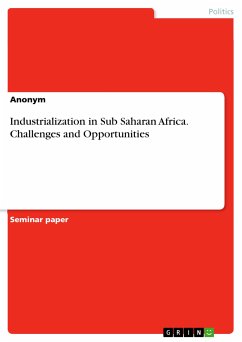Seminar paper from the year 2018 in the subject Politics - Topic: Globalization, Political Economics, grade: 1,0, Leuphana Universität Lüneburg, language: English, abstract: The main question that is supposed to be answered in this paper is: does Africa need Industrial policy for (sustainable) economic development? How are these policies supposed to look like and what are the preconditions to achieve them? To be able to find solutions for these interrelated questions, they have to be embedded in a broader context. First, a short introduction into the history of Africa's economic development, with regard to (de)industrialization, is being given. To understand why industrial policy might be of importance, one also has to look into the relationship between structural transformation and the chances of economic growth. This paper is aiming to give an overview about the reasons why Africa (mostly Sub-Saharan Africa) has missed industrialization, how structural transformation can lead to (sustainable) economic development and growth and which chances and challenges African countries face as late-industrializers in a world with high levels of globalization. The first part is meant to give a short introduction into the economic development and (de-)industrialization of modern post-colonial Africa. This is important as the current economic situation can only be fully understood by looking at what has happened in the past. The second part is giving theoretical input about structural transformation and the role of industrial policies - discussing its scientific background of pros and cons.
Dieser Download kann aus rechtlichen Gründen nur mit Rechnungsadresse in A, B, BG, CY, CZ, D, DK, EW, E, FIN, F, GR, HR, H, IRL, I, LT, L, LR, M, NL, PL, P, R, S, SLO, SK ausgeliefert werden.









